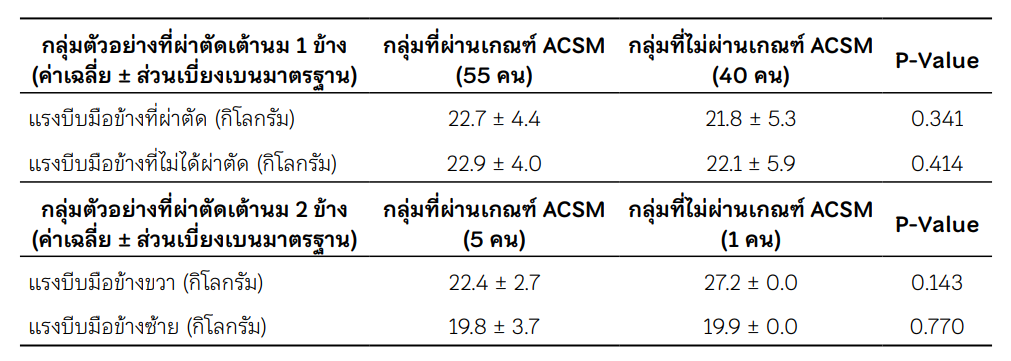Physical Activity and Physical Fitness of Breast Cancer Survivors After Surgery
Keywords:
Breast cancer survivors, Physical activity, Physical fitnessAbstract
Background: Highest physical activity (PA) of breast cancer survivors was associated with higher of physical performance, lower mortality rate and higher quality of life. The data of PA in breast cancer patients in Thailand still limited.
Objective: To investigate the level of PA and physical performance of 1-year postoperative breast cancer patients and compare the outcomes of physical performance between patients who met and did not meet the American College of Sport medicine (ACSM) recommendations
Study design: Cross-sectional descriptive study
Methods: A total of 101 patients with 1-year postoperative breast cancer were included in the study. All patients completed the Thai short version of International Physical Activity Questionnaire (IPAQ). The PA levels were categorized into patients who met the ACSM recommendations (a minimum of 150 min of moderate-intensity PA per week) and those who did not. Six-minute walk test (6MWT), 30s chair stand test, and hand grip strength test were assessed as the secondary outcomes.
Results: 59.4% of participants achieved the PA level according to the ACSM recommendations. The average time of moderate and vigorous PA was 325.92 min/week and 53.37 min/week, respectively. There was a significant longer 6MWT distance among patients who met the ACSM recommendations compared to who did not (446.5 and 382.7 meters, respectively) (p-value <0.001). Amount of time in 30s chair stand test among patients who met the ACSM recommendations was higher than who did not (13.4 and 11.3 times, respectively) (p-value = 0.005). However, no statistically significant difference of handgrip strength test was observed between the two groups of patients.
Conclusion: The prevalence of breast cancer survivors who achieved the PA level as ACSM recommendations was 59.4%. There were greater outcomes on 6MWT and 30s chair stand test in patients whose PA level achieve the ACSM recommendations. Our study suggests the need for future establishment of a robust PA with higher exercise interventions to enhance the PA behavior in postoperative breast cancer survivors.
Downloads
References
Virani S, Bilheem S, Chansaard W, et al. National and Subnational Population-Based Incidence of Cancer in Thailand: Assessing Cancers with the Highest Burdens. Cancers (Basel). 2017; 9(8): 108. https://doi.org/10.3390/cancers9080108 PMid:28817104 PMCid:PMC5575611
McDonald ES, Clark AS, Tchou J, Zhang P, Freedman GM. Clinical Diagnosis and Management of Breast Cancer. J Nucl Med. 2016;57 Suppl 1:9S-16S. https://doi.org/10.2967/jnumed.115.157834 PMid:26834110
Odle TG. Adverse effects of breast cancer treatment. Radiol Technol. 2014; 85(3): 297-319.
Lahart IM, Metsios GS, Nevill AM, Carmichael AR. Physical activity, risk of death and recurrence in breast cancer survivors: A systematic review and meta-analysis of epidemiological studies. Acta Oncol. 2015;54(5):635-54. https://doi.org/10.3109/0284186X.2014.998275 PMid:25752971
Lahart IM, Metsios GS, Nevill AM, Carmichael AR. Physical activity for women with breast cancer after adjuvant therapy. Cochrane Database Syst Rev. 2018;1:CD011292. https://doi.org/10.1002/14651858.CD011292.pub2 PMid:29376559
Schmitz KH, Courneya KS, Matthews C, et al. American College of Sports Medicine roundtable on exercise guidelines for cancer survivors. Med Sci Sports Exerc. 2010;42(7):1409-26. https://doi.org/10.1249/MSS.0b013e3181e0c112 PMid:20559064
Wattanapisit A, Thanamee S, Physical activity for breast cancer survivors: a literature review. J Sci & Tech 2017; 14(1): 1-10.
Lee PH, Macfarlane DJ, Lam TH, Stewart SM. Validity of the International Physical Activity Questionnaire Short Form (IPAQ-SF): a systematic review. Int J Behav Nutr Phys Act. 2011; 21; 8: 115. https://doi.org/10.1186/1479-5868-8-115 PMid:22018588 PMCid:PMC3214824
พรพิมล รัตนาวิวัฒน์พงศ์, อารมย์ ขุนภาษี, ฉกาจ ผ่องอักษร, ภัทราวุธ อินทรกำแหง. ความเที่ยงตรงและความน่าเชื่อถือของแบบสอบถามสากลเรื่องกิจกรรมทางกายชุดสั้นฉบับภาษาไทย. เวชศาสตร์ฟื้นฟูสาร. 2549; 16(3): 147-60.
กมลทิพย์ หาญผดุงกิจ. 6-Minute Walk Test. เวชศาสตร์ฟื้นฟูสาร. 2557; 24(1): 1-4
Galiano-Castillo N, Arroyo-Morales M, Ariza-Garcia A, et al. The Six-Minute Walk Test as a Measure of Health in Breast Cancer Patients. J Aging Phys Act. 2016;24(4):508-15. https://doi.org/10.1123/japa.2015-0056 PMid:26796231
Jones CJ. Rikli RE, Beam WC. A 30-s chair-stand test as a measure of lower body strength in community-residing older adults. Res Q Exerc Sport. 1999; 70(2): 113-9. https://doi.org/10.1080/02701367.1999.10608028 PMid:10380242
Cantarero-Villanueva I, Fernandez-Lao C, Diaz-Rodriguez L, Fernandez-de-Las-Penas C, Ruiz JR, Arroyo-Morales M. The handgrip strength test as a measure of function in breast cancer survivors: relationship to cancer-related symptoms and physical and physiologic parameters. Am J Phys Med Rehabil. 2012;91(9):774-82. https://doi.org/10.1097/PHM.0b013e31825f1538 PMid:22760108
Boing L, Pereira GS, Vieira MdCS, et al. Physical Activity and Quality of Life in Women with Breast Cancer - a Cross-Sectional Study. Rev Bras Med Esporte. 2018;24(5):377-81. https://doi.org/10.1590/1517-869220182405182631
Lahart IM, Metsios GS, Nevill AM, Carmichael AR. Physical activity levels in women attending breast screening, receiving chemotherapy and post-breast cancer treatment; a cross-sectional study. Int J Env Res Pub He. 2014; 11(5): 5487-96. https://doi.org/10.3390/ijerph110505487 PMid:24852599 PMCid:PMC4053910
Ortiz A, Tirado M, Hughes DC, et al. Relationship between physical activity, disability, and physical fitness profile in sedentary Latina breast cancer survivors. Physiother Theory Pract. 2018;34(10):783-94. https://doi.org/10.1080/09593985.2018.1424978 PMid:29319387

Downloads
Published
How to Cite
Issue
Section
License
Copyright (c) 2022 Chulabhorn Royal Academy

This work is licensed under a Creative Commons Attribution-NonCommercial-NoDerivatives 4.0 International License.
Copyright and Disclaimer
Articles published in this journal are the copyright of Chulabhorn Royal Academy.
The opinions expressed in each article are those of the individual authors and do not necessarily reflect the views of Chulabhorn Royal Academy or any other faculty members of the Academy. The authors are fully responsible for all content in their respective articles. In the event of any errors or inaccuracies, the responsibility lies solely with the individual authors.


